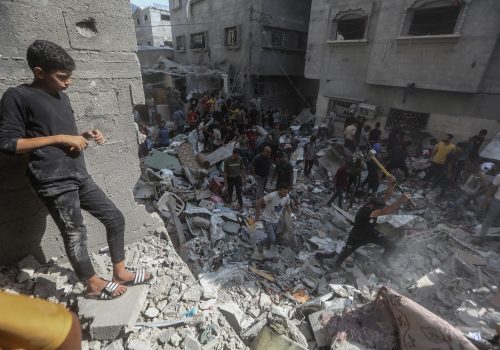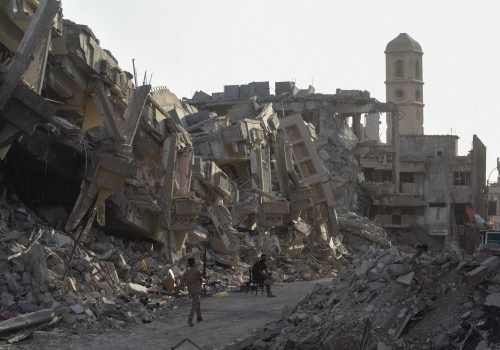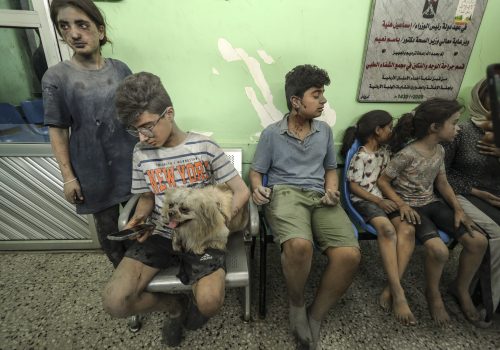Journalist Arwa Damon on conflict reporting: ‘You will leave a part of yourself behind’
Arwa Damon is a renowned Syrian-American journalist known for her work covering conflict in the Middle East. The September 11, 2001 terrorist attacks galvanized Damon to enter the field of journalism, where she worked for several years as a freelance producer covering the region before joining CNN in 2006. Damon worked with the cable news network for sixteen years as a Middle East correspondent, reporting on the 2011 Arab Spring, the fight against the Islamic State of Iraq and al-Sham (ISIS), and mass migration from the region. Damon’s important work garnered numerous accolades, including five Emmy Awards and a George Foster Peabody Award.
Inspired by her experience reporting on conflict in the Middle East, Damon founded the International Network for Aid, Relief, and Assistance (INARA), a nonprofit organization that focuses on building a network of logistical support and medical care to help children who need lifesaving or life-altering medical treatment in war-torn nations. Since 2015, Damon has acted as president of the organization, leading INARA in its mission to fill in the gaps in access to health services for children in communities worldwide. In 2022, she joined the Atlantic Council as a nonresident senior fellow.
Our MENASource editor, Holly Dagres, had the pleasure of chatting with the journalist on March 2 to discuss her recent projects, mental health in journalism, and the importance of effective storytelling.
MENASOURCE: Tell us your origin story. There is always a moment in life that sets you on the trajectory that gets you to where you are today. What led you to journalism?
ARWA DAMON: So, I have a degree in biology and French and a minor in international relations—so really glad I went to college for nothing to do with anything. I ended up in New York working for a Turkish textile company, which is basically a fancy way of saying, “I sold bathrobes and towels.” I had no experience in business whatsoever.
But I was in New York when September 11, 2001 happened. Obviously, the city was paralyzed and horrified, and a lot of realities came crashing down that day. I saw the dehumanization that happened afterward, and I remember burning inside, hearing the rhetoric that was being leveled toward Muslims and Arabs. I was very cognizant of the fact that I was spared a lot of what my more Middle Eastern-looking friends were because I’m blonde and I have green eyes. That, for me, was really it.
I had also realized in my years in the United States that because I grew up mostly in Morocco and Turkey, when I would speak about the Middle East, people would listen, people who were not necessarily interested. But here was someone who looked like them and spoke like them, and had a bit of their same mannerisms speaking about this place that was over there, the big, mysterious Middle East. It was the realization that when I spoke to people about this, they related to me because I look like them, and so that somehow made them relate more to the “other.”
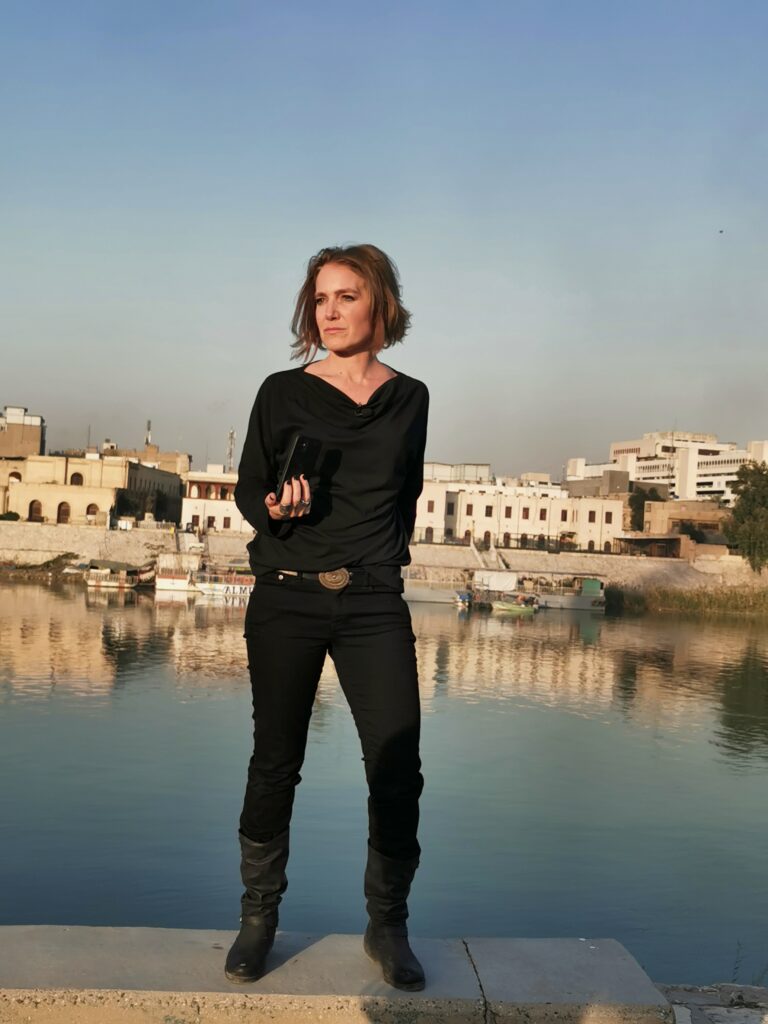
MENASOURCE: I would like to hear about the advantages that have supported you as a woman journalist, in addition to the potential challenges you’ve faced because of your background.
ARWA DAMON: Well, what is very interesting about being female is that you have access to both spaces. You have access to the male space, and you have access to the female space. There have been numerous situations where I can tackle subjects that a male colleague would not be able to just because women are more comfortable talking to each other about these things, especially when it comes to sexual violence and that sort of thing. I have personally found it to be an advantage to be a woman in the areas where I have worked because, for a lot of the men, you are a woman but you are also a journalist. So, they accept you into their midst to a certain degree, and you have access to all of that. And then, when the women are in the back room and a safe house, the male reporters cannot go in there and talk to them. But I could scurry in and just chitchat, then I could try to incorporate their story and their experience into the reporting. And I do think that gives us the advantage of more nuanced reporting and storytelling.
In terms of challenges, the hardest thing about being a woman in the field is finding a place to pee. Hands down. No joking. It is epic. If you are a guy, you can go almost anywhere. If you are not a guy, you are going to run into a lot of problems, and it is insanely uncomfortable.
MENASOURCE: What are you working on these days?
ARWA DAMON: I parted ways with CNN because I really wanted to start exploring different methods of storytelling, and I had an opportunity to film a documentary that I really felt could transcend a lot of perhaps the apathy that exists around the story of survivors of war and refugees, which was also an opportunity to bring that story to a much more diverse audience. What Seize the Summit does is follow this epic weeklong adventure up to the summit of Mount Kilimanjaro, with all of the questions of who is going to make it and who is not when the team is running out of oxygen and it is becoming harder to breathe.
I do a lot of mountains, and I have found that they will push you to a physical and psychological space that you did not even know that you could exist in, and in many ways, they force you to look inward and can be very healing. And the four climbers, who we take up and are all showcased in this documentary, are all survivors of war from Afghanistan, Ukraine, and Syria, and one of them is in a wheelchair.
And of course, I have my charity INARA, which is on a purely volunteer basis. But it eats up a lot of time, especially because crises in the areas where we work just keep coming.
MENASOURCE: You have me thinking about mental health in the world of journalism, especially conflict reporting. Do you think media outlets are doing enough in that realm?
ARWA DAMON: I can only speak to my experience at CNN. We always knew that the network would make resources available to us with no questions asked. I think there is a condition among a lot of people, but prevalent among journalists, to want to tough it out.
It is part of the whole “Keep going. Keep moving forward. I can get through this kind of thing” mentality, and we do not necessarily give ourselves the space to acknowledge the impact on us.
From my own personal experience, I was exactly that way. When you leave these extraordinarily intense situations, or when you leave behind people who have been through unimaginable horror and hardship, you carry their story with you, and you leave a part of yourself with them. And you also carry a lot of guilt. It is the guilt of leaving and having the privilege to leave. It is the constant questioning of “Did I do their story justice?” “Did I portray their pain in a way to move the world to take action?” And sadly, most of the time, the answer to that last question is that we do not see the sort of mass global movements to alleviate people’s pain.
Whether that is reporting on protests, people demanding equal rights, or the horrors and atrocities of a war zone, I think oftentimes for journalists the impact that we really hope our journalism would make is not necessarily there. And for me, that led to a lot of self-doubt and questioning. If I were to ever write a book about my life, it would be called Not Good Enough.
But you try to tough it out, and for myself, I would default to anger. It took me a while to be able to recognize that I was poisoning myself. I was becoming very toxic to myself and then trying to find the tools to work through that, which is not just that I have it all figured out.
The whole process is like a roller coaster. You are at the bottom of this cesspool trying to claw your way out, and the minute you make it to the edge of the cliff and you are hanging on, you say, “Okay, I’m fine again,” and then you just allow yourself to fall back down. And at the end of the day, you do not end up doing yourself, or the people suffering, any favors.
MENASOURCE: What have been your coping mechanisms?
ARWA DAMON: So again, just speaking from my own personal experience, I have, on two occasions, gone to see a normal psychologist. For me, that did not work. I think it was because their frame of reference was so different to what my frame of reference was for things, and I did not necessarily find that to be very beneficial. What worked for me personally very well was EMDR (eye movement desensitization and reprocessing). That could have also been because who I was doing it with was actually a former journalist himself. All I had to do was go in and sit in front of him, and in our first session, I said, “I have spent seven years reporting out of Iraq,” and he just got it like that. He knew where I was coming from, and that, for me, was very beneficial.
I have also found that less conventional techniques have worked better for me, like breathing and looking inward…There are a lot of different kinds of breathing techniques, but it is not really meditation.
So, for me, if I lose my passion and my fire and my anger, I’m going to lose my drive. And this whole notion of needing to be better and the anger that I have at myself, that is my driver. But what I realized with EMDR and the work I was doing is that I still had the passion and the drive. Everything is still there. It is just not emotionally quicksanding me.
MENASOURCE: You brought up not being good enough. I certainly suffer from imposter syndrome, and I think a lot of women in our field, whether it is journalism or foreign policy, suffer from that. Do you get a sense that, as a trailblazing Syrian-American journalist, there was a lot of pressure on you to do well in your career because you are an Arab-American woman living in a post-9/11 world?
ARWA DAMON: First of all, the not good enough notion, I do not think is necessarily imposter syndrome for me. It is just this idea that comes from the notion that, if it had been done well enough, then surely change would have occurred. And because change is not occurring to the scope that one goes into journalism thinking that they are going to be able to generate, that turns into “Obviously, it must be my fault because the reporting was not good enough. If it had been good enough, if it had been powerful enough, something would have to change.”
I do not think I’m hard on myself; I think I’m honest with myself, but everyone around me will tell me that I’m abnormally hard on myself. I think that I put an extraordinary amount of pressure on myself.
I do not think that any of the sort of pressure points that I felt have necessarily been because of imposter syndrome. I’m part of this fortunate cadre of women who already had the glass ceiling broken for them. We had the generation of Christiane Amanpour, Marie Colvin, Lyse Doucet, Liz Sly, and a whole host of women who broke that glass ceiling for us. And if you look back to the core Baghdad (Iraq War) years, the press corps was split pretty fifty-fifty.
I think the pressure I put on myself comes from the fact that I’m perhaps uniquely positioned because I’m Arab-American. I did grow up in a household that was very cross-cultural. It was a fully bilingual household. I like to say breakfast was labneh with za’atar and blueberry pancakes. And I look so American, I sound so American, so I really hoped that I could be something of a bridge between cultures and peoples because my heart, my soul, my essence is so blended.
MENASOURCE: If there was anything you could tell your younger self, what would you tell her?
ARWA DAMON: I think about that question a lot. I believe we are a product of our mistakes and the times that we stumble and fall. So, if I were to turn to my younger self and tell her anything, she would not have made all the mistakes that she did, and she would not have stumbled and fallen all of the times that she did, and she would not be where she is today. So, in some ways, I do not think I would tell her anything because no matter how hard it gets sometimes, I do not regret where I’m right now or what I’m able to do right now, even though I do have this desire to do more and do better. I think I would be too nervous that she would veer off the path that led me here to want to say anything to her.
SIGN UP FOR THE THIS WEEK IN THE MIDEAST NEWSLETTER
MENASOURCE: You have covered many stories from the Middle East. Is there a specific one that really stands out to you?
ARWA DAMON: Look, there is a lot. But then my brain automatically, when I get asked that question, goes to the first time I heard pain, fully heard what it sounds like. I’m talking about the kind of pain that comes from a person’s gut and feels as if it is emanating from them and grabbing you by the throat with its tentacles.
And that was in Iraq during the Battle of Samarra. I think it was October 2004. We had gone in embedded with the US military. I was a producer back then, and this was after the battle for the city—which was this craziness of what battles are—and we were driving with the Americans to the area that they designated as the morgue, and Iraqi civilians were making their way there to identify their loved ones. And I remember sitting in the Humvee, looking at everything through the thick bulletproof, dust-covered glass, and we drove past a woman. In my mind’s memory, everything is slow motion, but it could not have been as slow as I remember it being. But this woman was wearing the full black covering, and she just drops to her knees, and the covering falls off her head, and her hair comes tumbling out, and this scream comes out of her. That is the first time I really heard pain.
MENASOURCE: How do you pick your stories?
ARWA DAMON: It depends on what you are going to cover. So, I defaulted to the Middle East because my value added to that storytelling is that I’m an Arabic speaker and I can have a direct conversation with somebody, which makes all the difference compared to going through a translator. And very early on, I was always focused on the small emotional connectors that can help enhance a story. It has been finding those little things that people would not necessarily think to relate to.
So, if we are talking about civilians fleeing bombing in Syria, this is a story that has been done over and over again. But if you can walk into that story and look at it from the perspective of an audience that really has no frame of reference for this experience, you can focus on a different part of the story. The children are cold, hungry, and scared, and any child who is cold, hungry, and scared should be screaming, crying, or nagging their parents. These children are not. That is how deep the trauma is.
So, I constantly find myself looking for those little details when I’m out in the field. That is my frame of reference for everything. I try to find reference points of commonality because that is how people relate to each other. Unfortunately, a lot of that is on the extreme of the emotional spectrum. Extreme pain or extreme joy.
And then another approach, maybe it is very simple, is that I try to break down boundaries. This has nothing to do with anything we are talking about, but here is a funny story. So, we were doing this INARA event down in Gaziantep, Turkey, and the Syrian kids were painting T-shirts, and a bunch of the girls were painting “BTS” on their T-shirts. I literally had absolutely no clue what was going on, and I went up to one of our caseworkers, and I was like, “Are they trying to spell something or like, are they misspelling something?” And she is like, “No, it’s BTS,” and I’m like, “What is BTS?” And it is like some famous K-pop band that these refugee girls should know absolutely nothing about. But here they are, part of this global young teen female hysteria about something.
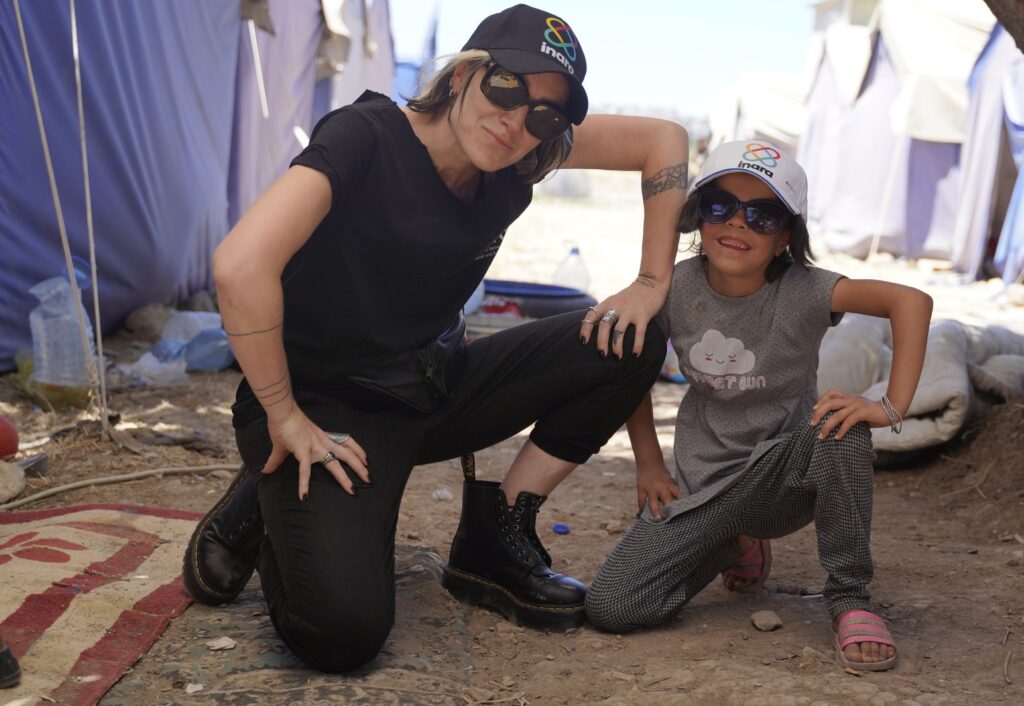
So, if I had actually been covering that as a journalist, I would have totally highlighted that whole aspect with it because everyone can relate to teenage fandom except for me because I live under a rock.
In terms of choosing your stories, you also need to look at where you are best suited to tell the most powerful story. For example, am I best suited to tell the most powerful story in a region where I do not speak the language, where I do not have a lived historical experience, or is someone else better suited to that? That is not to say you do not go and cover other stories. It is about trying to align your natural interest with what it is that you want to cover. So, for me, it has always been the human story and war. I also get all riled up about sexual slavery, about forced migration, about abuses that happen on the migration route. I mean, give me a lost cause, and I will be your champion.
MENASOURCE: What do you think right now is one of the more underreported stories?
ARWA DAMON: So, here is the thing that I get really curious about a lot of times, even when it’s stories that I have covered in the past. It is the “Well, what is going on with them now?”
If you take big moments that have happened, and then the media spotlight moves away, and then a few years go by. Of course, we all know that it is not over, and it is never over. But if we look at, for example, the Yazidis who were kidnapped by ISIS, some of whom were rescued, some of whom were released. Where are they now? It has been years. How does life get rebuilt after something like that? Does it even get rebuilt? These are things that I know because I pay attention to what is happening. But if we are going to talk about a global stage, there are these key global moments that sort of captivated the world’s attention. But where are they now?
MENASOURCE: What advice would you bestow upon the new generation of women journalists starting out in the field?
ARWA DAMON: I say this to anyone who asks me that question: You need to know that you will leave a part of yourself behind. You will crack into so many pieces, and those pieces will get left behind with the people you have met whose stories you have tried to tell. And you need to be okay with that. You need to be okay with the way that it is going to affect you.
I would tell someone young coming into journalism: “Do not be afraid to ask for help.” If someone says they will look at your work and then they do not, push them for it. I remember when I was starting out, I was working for this bathrobe double-ply company, and I wanted to be a journalist. So, of course, I reached out to a bunch of people, and I remember to this day the one person who responded to me. And it was not that it was groundbreaking. It did not pave the way for me, but I still remember that she bothered to respond to me.
I know that there are some organizations that are trying to build these sorts of networks and the whole mentorship concept. But it can be quite difficult, even when you are trying to mentor somebody, because I would love to take more people under my wing.
What is the point of having a skillset, or twenty years of experience, if you are not going to share it? That is my philosophy. I do not know if everybody has it. The field is also disgustingly competitive…I think we owe it to the next generation to make ourselves more available. Male or female, actually.
Holly Dagres is a nonresident senior fellow in the Atlantic Council’s Middle East programs and editor of the Atlantic Council’s IranSource and MENASource blogs. Follow her on X: @hdagres.
Further reading
Tue, Oct 24, 2023
I spent two decades as a CNN correspondent. We journalists need to do a better job reporting the truth.
MENASource By Arwa Damon
The media needs to realize and recognize the role we can play in fueling polarization and hate.
Wed, Nov 15, 2023
I covered the battle against ISIS in Mosul. Gaza’s challenges will make it look like child’s play.
MENASource By Arwa Damon
If there is something to be drawn from those lessons, it is that what Israel is doing right now will secure anything but peace and stability.
Thu, Oct 12, 2023
Gaza under siege: A doctor recounts the humanitarian cost of war
MENASource By Arwa Damon
Dr. G is no stranger to war zones. He’s a plastic and reconstructive surgeon who often volunteers when bombs and disasters strike.
Image: Journalist Arwa Damon covering the Beirut blast in 2020 PC: Pierre Bairin
